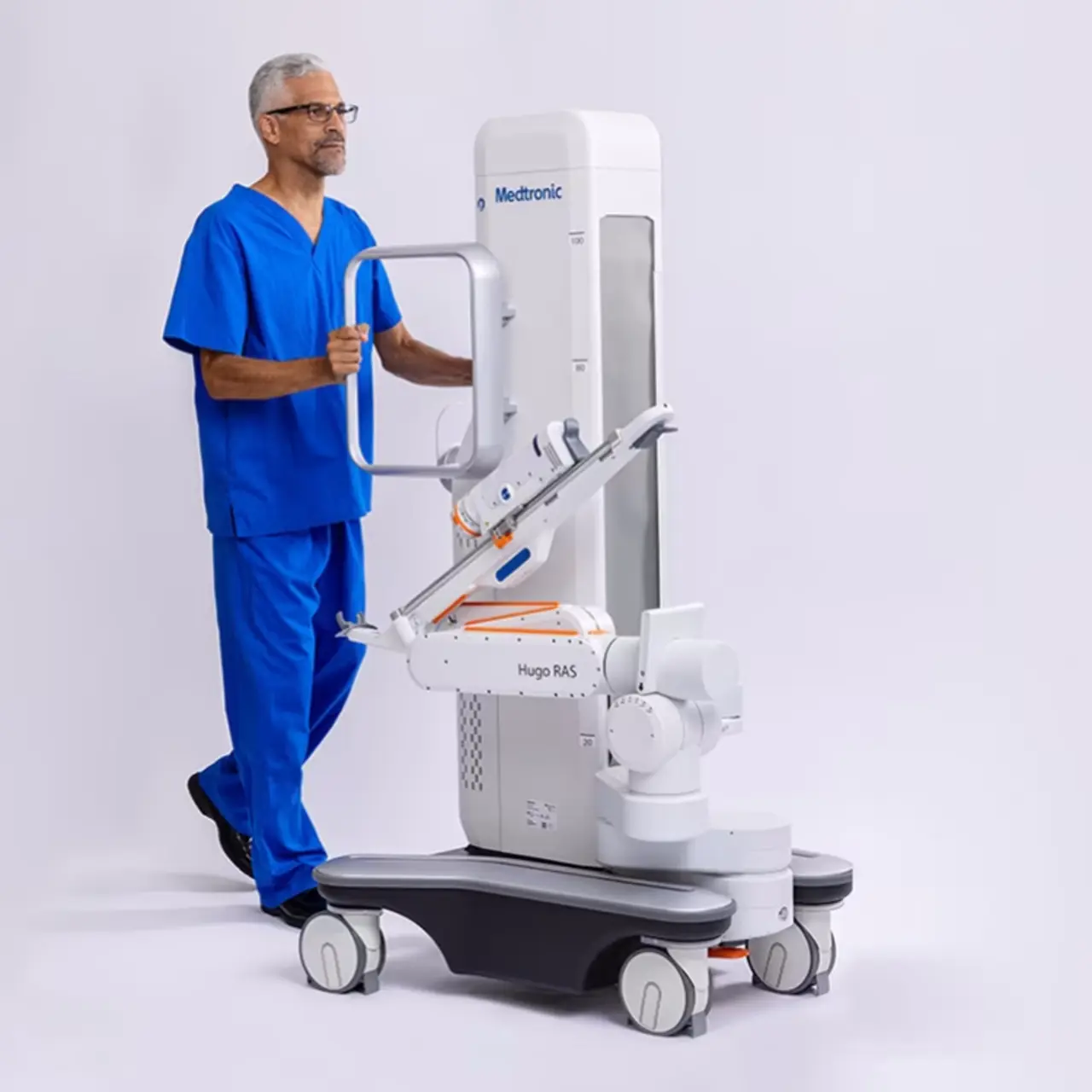From space to OR
Robot Hugo Treats Prostate for the First Time
Da Vinci surgical robot gets a new colleague: Dresden University Hospital has »Hugo«, a new high-tech surgeon for minimally invasive urology, in operation. The physicians control the precision robot, originally developed for space travel, by console.
The first urological operation in Germany using the Hugo surgical robot took place in Dresden in mid-October - a 78-year-old man underwent prostate adenoma enucleation (surgical excision of an adenoma) for benign prostate enlargement.
Robot Park for Greater Precision
With Medtronic's Hugo, Dresden University Hospital completes its existing surgical robot park of three Da Vinci colleagues, making it the only hospital in central Germany with this equipment. The robot will mainly be used in urology, but it is also available for visceral, thoracic and vascular surgery at the university hospital. Hugo can be used to perform minimally invasive and thus gentle procedures - the patient treated is well one week after the robotic intervention.
With Hugo, which cost 1.7 million euros, the Dresden specialists have a new and highly developed medical device at their disposal. »Our medical and nursing staff can now work, learn and train with two different types of robots,« says Frank Ohi, Commercial Director of the University Hospital.
Space Technology for Medtronic
The robot is based on the Miro Surge technology of the German Aerospace Center (DLR) and its Institute of Robotics and Mechatronics. Originally, the robotic arm - controlled from Earth - was to perform repairs on space stations in space. The transfer of the technology took place at Medtronic's site in Weßling, Bavaria. The Medtronic Surgical Robotics team there worked with colleagues from around the world on the hardware and software for the Hugo RAS system.
| The Hugo RAS surgical robot |
|---|
| Medtronic's Hugo surgical robot provides high-definition 3D vision via an open console without compromising situational awareness during surgery. The physician in charge controls the robotic arms and instruments, which offer greater freedom of movement than traditional laparoscopic techniques. This allows the surgeon to be more precise, especially since he or she can work with a magnified, high-resolution, real-time, three-dimensional image of the surgical field on the monitor. The interactive display provides a high-resolution view of the surgical field, while additional video outputs allow connection to an existing OR display system. So far, the robot has mainly been used in visceral surgery and urology. Medical professionals thus have a new generation of modern surgical robots at their disposal. |
Focus on Patients Instead of Technology
The two robotic systems offer many advantages for patients. Depending on the individual findings as well as the body part to be treated, the doctors can choose the most suitable medical system for the surgery. Hugo has four very individually adjustable arms and an open console. This brings the surgeons' work closer to the center of the team again. The new robot also gives the medics a better view of the operation again. In contrast, the four arms of the Da Vinci surgical robot are operated via a separately standing console away from the operating table. For The OR team, Hugo once again puts the focus less on technology and more on patient well-being.

Diverse Robo Surgery Without Monopoly
In addition to clinical use, the robo-urologist will also be used for scientific purposes. »The simultaneous availability of the two most sophisticated and highly developed surgical robotic systems provides Dresden University Medicine with a unique opportunity to prospectively investigate scientific issues related to oncological outcomes, anatomical function preservation, economic aspects and challenges for medical staff between the two systems,« highlights Prof. Michael Albrecht, Medical Director of Uniklinikum.
»The robotic diversity now allows us to expand our expertise. In the future, we want to offer training in the use of the Hugo and are also researching the integration of artificial intelligence in its use,« says Prof. Christian Thomas, Director of the Clinic and Polyclinic for Urology. »Robotic diversity should ensure that modern minimally invasive surgery is not automatically associated with a manufacturer in the future.« (uh)





